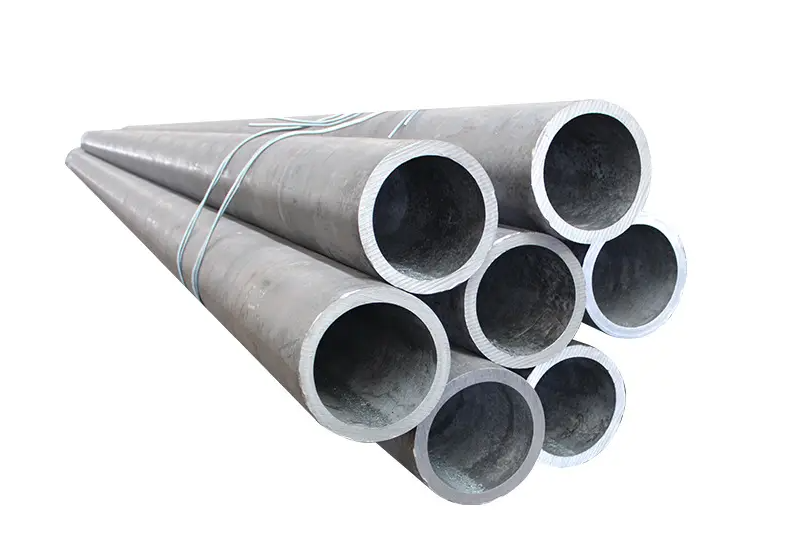ASTM A519 Steel Pipe

ASTM A519 Mechanical Steel Pipe
Introduction
ASTM A519 is a standard specification for seamless carbon and alloy steel mechanical tubing. These pipes are used in various mechanical and structural applications where high strength, toughness, and precise dimensions are required. The specification includes several grades, each designed to meet specific mechanical properties and chemical compositions.
Size range(mm):
- Out diameter:10-324mm
- Wall Tickness:1-30mm
- Length:14000mm max
Key Grades and Chemical Composition
ASTM A519 covers a range of carbon and alloy steel grades, including:
- 1010
- 1020
- 1026
- 4130
- 4140
- 8620
Chemical Composition
Here are the chemical compositions for some common ASTM A519 grades:
Grade 1010
- Carbon (C): 0.08 – 0.13%
- Manganese (Mn): 0.30 – 0.60%
- Phosphorus (P): ≤ 0.04%
- Sulfur (S): ≤ 0.05%
Grade 1020
- Carbon (C): 0.18 – 0.23%
- Manganese (Mn): 0.30 – 0.60%
- Phosphorus (P): ≤ 0.04%
- Sulfur (S): ≤ 0.05%
Grade 4130
- Carbon (C): 0.28 – 0.33%
- Manganese (Mn): 0.40 – 0.60%
- Phosphorus (P): ≤ 0.035%
- Sulfur (S): ≤ 0.04%
- Silicon (Si): 0.15 – 0.35%
- Chromium (Cr): 0.80 – 1.10%
- Molybdenum (Mo): 0.15 – 0.25%
Grade 4140
- Carbon (C): 0.38 – 0.43%
- Manganese (Mn): 0.75 – 1.00%
- Phosphorus (P): ≤ 0.035%
- Sulfur (S): ≤ 0.04%
- Silicon (Si): 0.15 – 0.35%
- Chromium (Cr): 0.80 – 1.10%
- Molybdenum (Mo): 0.15 – 0.25%
Grade 8620
- Carbon (C): 0.18 – 0.23%
- Manganese (Mn): 0.70 – 0.90%
- Phosphorus (P): ≤ 0.035%
- Sulfur (S): ≤ 0.04%
- Silicon (Si): 0.15 – 0.35%
- Chromium (Cr): 0.40 – 0.60%
- Nickel (Ni): 0.40 – 0.70%
- Molybdenum (Mo): 0.15 – 0.25%
Mechanical Properties
The mechanical properties of ASTM A519 pipes vary depending on the grade and the heat treatment applied. Here are some typical properties for common grades:
Grade 1010
- Tensile Strength: 365 MPa (53,000 psi)
- Yield Strength: 205 MPa (30,000 psi)
- Elongation: ≥ 20%
Grade 1020
- Tensile Strength: 415 MPa (60,000 psi)
- Yield Strength: 245 MPa (35,000 psi)
- Elongation: ≥ 15%
Grade 4130
- Tensile Strength: 560 MPa (81,000 psi)
- Yield Strength: 460 MPa (67,000 psi)
- Elongation: ≥ 20%
Grade 4140
- Tensile Strength: 655 MPa (95,000 psi)
- Yield Strength: 415 MPa (60,000 psi)
- Elongation: ≥ 18%
Grade 8620
- Tensile Strength: 620 MPa (90,000 psi)
- Yield Strength: 415 MPa (60,000 psi)
- Elongation: ≥ 15%
JIS number and corrensponding foreign standards
| JIS | ASTM | BS | DIN | NF | ISO | Index Number | ||||||||||||
|---|---|---|---|---|---|---|---|---|---|---|---|---|---|---|---|---|---|---|
| Standard Number | Grade | Tupe | Standard Number | Grade | Tupe | Standard Number | Grade | Tupe | Standard Number | Grade | Tupe | Standard Number | Grade | Tupe | Standard Number | Grade | Tupe | |
| G3445 | STKM11A | C | ASTM A512 | MT1010 | C | 1717 | ERWC1 | C | 2391 | St30Si | C | 3304 | R28 | C | C017 | |||
| ASTM A513 | MT1010 | C | St30A1 | C | 3305 | “ | C | |||||||||||
| 2393 | St28 | C | 3306 | “ | C | |||||||||||||
| RSt28 | C | |||||||||||||||||
| 2394 | St28 | C | ||||||||||||||||
| USt28 | C | |||||||||||||||||
| RSt28 | C | |||||||||||||||||
| STKM12A | C | ASTM A512 | MT1015 | C | 1717 | ERWC2 | C | 2391 | St37-2 | 3304 | R33 | C | ||||||
| ASTM A513 | MT1015 | C | 6323 | HFS3 | C | RSt37-2 | 3305 | “ | “ | |||||||||
| STKM12B | C | ASTM A512 | MT1015 | C | 2394 | St37-2 | 3306 | “ | “ | |||||||||
| ASTM A513 | MT1015 | C | Ust38-2 | |||||||||||||||
| ASTM A519 | MT1015 | C | RSt-2 | |||||||||||||||
| STKM12C | C | 1717 | CEWC2 | C | A49-322 | TU37b | C | |||||||||||
| “ | CFSC3 | C | A49-327 | TU37b | C | |||||||||||||
| 6323 | CFS3 | C | ||||||||||||||||
| “ | CFS3A | C | ||||||||||||||||
| STKM13A | C | ASTM A312 | MT1020 | C | 1717 | ERWC3 | C | 2391 | St45 | C | A49-324 | TU37b | C | 2937 | TS4 | C | ||
| ASTM A513 | MT1020 | C | 2393 | St44-2 | C | A49-330 | TU37b | C | 3304 | R37 | “ | |||||||
| 2394 | St44-2 | C | A49-343 | TU38b | C | 3305 | “ | “ | ||||||||||
| STKM13B | C | ASTM A513 | MT1020 | C | 3306 | “ | “ | |||||||||||
| STKM13C | C | 1717 | CEWC3 | C | ||||||||||||||
| “ | CFSC4 | C | ||||||||||||||||
| 6323 | CFS4 | C | ||||||||||||||||
| STKM14A | C | ASTM A513 | MT1020 | C | 6323 | HFS4 | C | 2937 | TS9 | C | ||||||||
| 3304 | R42 | “ | ||||||||||||||||
| STKM14B | C | 6323 | HFS5 | C | 3305 | R42 | C | |||||||||||
| STMK14C | C | 3306 | “ | “ | ||||||||||||||
| STKM15A | C | ASTM A513 | 1030 | C | ||||||||||||||
| ASTM A519 | 1030 | C | ||||||||||||||||
| STKM15C | ||||||||||||||||||
| STKM16A | C | ASTM A519 | 1040 | C | A49-311 | TUXC35 | C | |||||||||||
| A49-312 | TUXC35 | C | ||||||||||||||||
| STKM16C | C | |||||||||||||||||
| STKM17A | C | ASTM A519 | 1050 | C | 6323 | HFS8 | C | |||||||||||
| STKM17C | C | 6323 | CFS8 | C | ||||||||||||||
| STKM18A | C | ASTM A519 | 1518 | C | 1717 | ERWC5 | C | A49-310 | TU52b | C | ||||||||
| A49-311 | TU52b | C | ||||||||||||||||
| A49-312 | TU52b | C | ||||||||||||||||
| STKM18B | C | A49-321 | TU52b | C | ||||||||||||||
| A49-323 | TU52b | C | ||||||||||||||||
| A49-326 | TU52b | C | ||||||||||||||||
| STKM18C | C | A49-330 | TU52b | C | ||||||||||||||
| A49-341 | TS42a | C | ||||||||||||||||
| “ | TS47a | C | ||||||||||||||||
| A49-343 | TS18M5 | C | ||||||||||||||||
| STKM19A | C | ASTM A519 | 1524 | C | 2391 | ST52 | C | 2937 | TS18 | C | ||||||||
| 2393 | ST52-3 | C | 2938 | Gr.1 | C | |||||||||||||
| 2394 | ST52-3 | C | 3304 | R50 | C | |||||||||||||
| 3305 | R50 | C | ||||||||||||||||
| 3306 | R50 | C | ||||||||||||||||
| STKM20A | C | |||||||||||||||||
| G3441 | SCr420TK | Cr | C018 | |||||||||||||||
| SCM415TK | CrMo | |||||||||||||||||
| SCM418TK | CrMo | 6323 | CFS10 | CrMo | ||||||||||||||
| SCM420TK | CrMo | ASTM A519 | 5120 | CrMo | ||||||||||||||
| SCM430TK | CrMo | ASTM A519 | 4130 | CrMo | ||||||||||||||
| SCM435TK | CrMo | ASTM A519 | 4135 | CrMo | ||||||||||||||
| SCM440TK | CrMo | ASTM A519 | 4140 | CrMo | 6323 | CFS10 | CrMo | |||||||||||
Manufacturing Process
Seamless Pipe Manufacturing
Seamless mechanical tubing under ASTM A519 is produced using a variety of methods:
- Billet Heating: Steel billets are heated to a high temperature to make them malleable.
- Piercing: The heated billet is pierced to create a hollow tube.
- Rolling: The hollow tube is rolled to achieve the desired diameter and wall thickness.
- Sizing: The pipe is further processed to achieve precise dimensions.
- Cold-Drawing (Optional): The pipe may be cold-drawn to refine dimensions and improve mechanical properties.
Heat Treatment
Heat treatment is often applied to achieve the desired mechanical properties:
- Annealing: Heating the pipe to a high temperature and then slowly cooling it to soften the material and improve ductility.
- Normalizing: Heating the pipe to a specific temperature and then cooling it in air to refine the grain structure.
- Quenching and Tempering: Heating the pipe to a high temperature and then rapidly cooling it (quenching), followed by reheating to a lower temperature (tempering) to improve toughness and reduce brittleness.
Testing Requirements
ASTM A519 specifies several tests to ensure the quality and performance of the pipes:
- Tensile Test: Measures tensile strength, yield strength, and elongation.
- Hardness Test: Ensures the material meets specified hardness requirements.
- Non-Destructive Testing (NDT): Methods such as ultrasonic testing (UT) or magnetic particle testing (MT) are used to detect internal and surface flaws.
- Dimensional Inspection: Ensures the pipes meet specified dimensions and tolerances.
Applications
ASTM A519 mechanical steel pipes are used in various applications, including:
- Automotive Industry: Drive shafts, axles, and other critical components.
- Construction: Structural components in buildings, bridges, and other infrastructure.
- Machinery: Components for heavy machinery and equipment.
- Oil and Gas Industry: Pipes and tubing for drilling and extraction equipment.
- General Engineering: Shafts, bearings, rollers, and other mechanical parts requiring precise dimensions and high strength.
Advantages and Limitations
Advantages
- High Strength: Suitable for high-stress applications.
- Durability: Designed for long-term performance in demanding environments.
- Precise Dimensions: Cold-drawing and other manufacturing processes ensure tight dimensional tolerances.
- Versatility: Applicable to a wide range of industries and uses.
Limitations
- Cost: Higher cost compared to welded pipes due to the seamless manufacturing process.
- Complex Manufacturing: Requires precise control of chemical composition and heat treatment processes.
- Availability: Specific grades and sizes may have longer lead times.
Conclusion
ASTM A519 mechanical steel pipes are essential for applications requiring high strength, durability, and precise dimensions. Their superior mechanical properties, combined with rigorous manufacturing and testing processes, ensure they meet the demanding requirements of various industries. Understanding the detailed specifications, grades, and applications of ASTM A519 pipes helps engineers and designers select the right materials for their projects, ensuring safety and efficiency in challenging environments.
By examining the chemical composition, mechanical properties, manufacturing processes, and applications, this analysis provides a comprehensive overview of ASTM A519 mechanical steel pipes, highlighting their significance in high-performance industrial applications.







